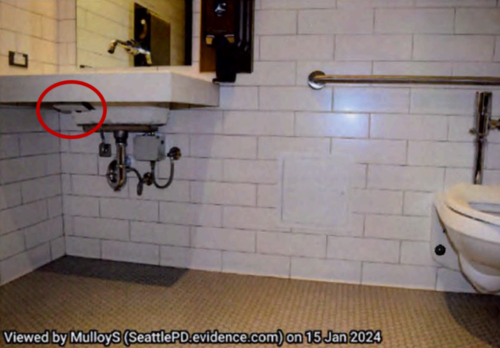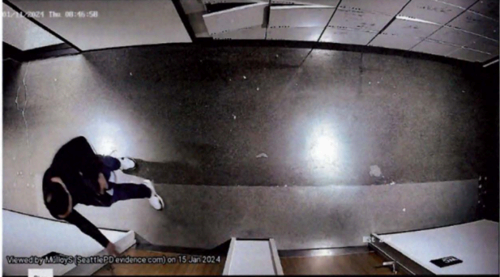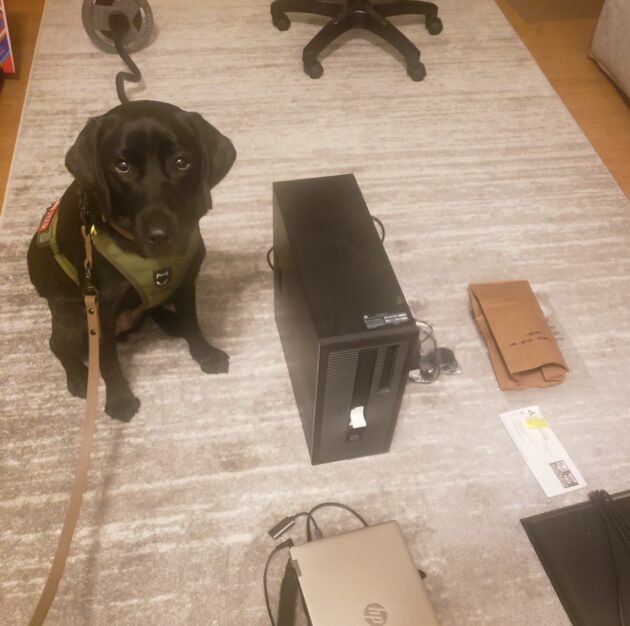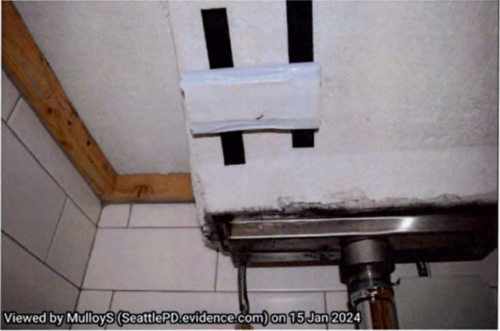
A Lynnwood, Wash., man has been charged with voyeurism based on allegations that he placed cameras under the sinks in two bathrooms at the Expedia Group headquarters on the Seattle waterfront in December and January.
Marcelo F. Vargas-Fernandez, 42, who was an Expedia Group employee at the time of the alleged incidents, was arrested Feb. 1 by Seattle police, who found at least 33 additional spy cameras when executing a search warrant inside his apartment, according to a probable cause affidavit accompanying the charges.
A specially trained, electronics-detecting dog helped investigators locate some of the equipment during their search of the apartment, authorities said.
King County Prosecuting Attorney Leesa Manion has charged Vargas-Fernandez with four counts of first-degree voyeurism. He is set to be arraigned Thursday, Feb. 15, in King County Superior Court in Seattle.
Vargas-Fernandez denied involvement when initially questioned by police, according to the probable cause affidavit. His attorney, Charles R. Varni, has not yet responded to messages from GeekWire seeking comment.
Evidence cited by Seattle Police Department investigators included images from an Expedia Group security camera in the hallway outside the bathrooms. Police say these images show Vargas-Fernandez entering and exiting the bathrooms while holding devices consistent in appearance with the those found under the sinks.

Police also used a warrant to obtain records from Amazon.com indicating that Vargas-Fernandez purchased cameras in October that matched those found in the restrooms, according to the probable cause affidavit.
The cameras were initially discovered in early December, but then disappeared after security personnel decided not to remove them, according to the affidavit. They then reappeared in January, and this discovery set off a new chain of events that ultimately led to Vargas-Fernandez’s arrest.
Expedia Group issued this statement:
We are committed to protecting the privacy, safety, and security of our employees and guests at our offices. Although we do not typically provide comment on internal situations, we felt necessary to share an update on the matter. We took immediate action the moment we discovered the issue and contacted local law enforcement to assist. In addition, the individual is no longer employed by Expedia Group. We continue to take this matter very seriously and are working closely with the appropriate authorities.
Vargas-Fernandez’s LinkedIn profile appears in Google search results but is no longer publicly accessible. We haven’t yet verified his former role at Expedia Group, or how long he worked for the company.
Expedia Group moved to its expansive campus overlooking Elliott Bay in Seattle in the fall of 2019 from its previous location in Bellevue, Wash. In addition to serving as the company’s headquarters, the facility is a venue for events such as Expedia Group’s annual Explore 23: Connect partner conference last spring.
Investigators “observed at least 10 distinct victims visible in the defendant’s illegal footage” seized in January, the probable cause affidavit says. “It is reasonable to believe that several more victims have yet to be discovered, given the large volume of seized electronic evidence pending law enforcement review.”
The cameras in the Expedia bathrooms were “specifically aimed at the toilet in all-gender single occupancy restrooms, allowing him to view the private use and genitalia of restroom users,” the prosecuting attorney wrote in a summary of the case filed with the court.
Equipment found in Vargas-Fernandez’s home included at least 33 spy cameras in various forms, 22 SD cards, and six hard drives with at least 20 terabytes of storage capacity, according to an update to the affidavit after his booking. The prosecuting attorney said the state “has cause for concern that there are additional venues where the defendant has illegally placed cameras.”

Some of the devices were found during the search with help from Trinity, a dog trained to detect electronics, much as other dogs are trained to detect drugs, cadavers, or explosives.
“Given that law enforcement was looking for cameras designed for concealment, this case seemed like the ideal use of such a specialized K-9,” said Gary Ernsdorff of the King County Prosecutor’s Office, via email. Trinity was “highly valuable in alerting law enforcement to the presence of cameras whose secret function was not readily apparent.”
The events that led to Vargas-Fernandez’s arrest started in early December. One of the victims of the alleged voyeurism, an Expedia Group employee, first spotted one of cameras when using one of the single-occupancy, non-gender bathroom on the afternoon of Dec. 4, the probable cause affidavit says.
“He sat down and was using the toilet when something caught his attention under the sink. He looked over towards his right and thought it looked weird. A flurry of thoughts went through his head while trying to figure out what it was,” Seattle Police Detective Sarah Mulloy wrote in the affidavit.

After looking closer, and realizing it seemed to be a camera, the employee subsequently found a similar device under the sink of an adjacent bathroom, and notified security about what he had found.
However, after that initial discovery, “security supervisors made the decision not to take the devices because at the time they thought it was a music device or a battery backup for the soap dispensers,” the affidavit said.
Expedia contracts with the firm Securitas for security services at its headquarters. The next morning, the employee who discovered the devices went back to the bathrooms and checked for the cameras, saw that they were gone, and initially assumed security had taken them. He was later dismayed to learn that they had not.
More than a month later, on Jan. 11, a co-worker of the employee who had discovered the cameras in December was using one of the bathrooms and spotted a device similar to the ones described in their conversations, the affidavit said. The employees put “Out of order” signs on the doors and alerted security.
While the bathrooms were closed, the employee who originally reported the cameras noticed someone who seemed to be acting suspiciously, returning twice to try to use both bathrooms, according to the affidavit.
The employee later pointed the person out to security, who talked to the person and identified him by his badge as Vargas-Fernandez. However, Vargas-Fernandez “stated he had not been by those bathrooms,” the affidavit said.
The prosecuting attorney said this as part of the case summary:
The defendant has further demonstrated that he is likely to interfere with witnesses and the administration of justice by removing the cameras once he realized they were discovered by another employee. The defendant waited a month to reinstall the cameras in the same restrooms. When the cameras were again discovered and the restrooms were placed out of order, the defendant was seen pacing nervously around the area and walking up to victims and witnesses, asking about what was happening.
The prosecuting attorney is seeking bail of $200,000, with electronic home monitoring if bond is posted, plus restrictions from internet access and no possession of devices that can take photos, among other conditions.

